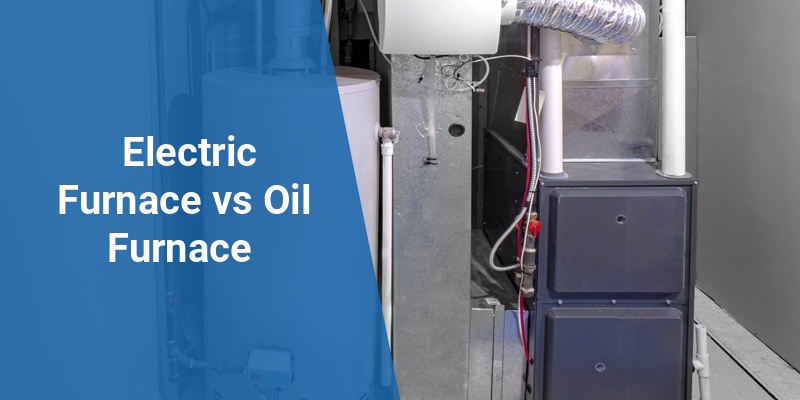Choosing between an electric furnace and an oil furnace for home heating involves understanding their operational differences, cost efficiency, environmental impact, and maintenance requirements. Both types serve the core purpose of heating indoor spaces but vary significantly in how they function and what they offer homeowners. This guide provides an in-depth comparison to help homeowners make informed decisions on which heating system suits their needs best.
| Aspect | Electric Furnace | Oil Furnace |
|---|---|---|
| Energy Source | Electricity | Heating oil |
| Installation Cost | Lower initial cost | Higher initial cost |
| Operational Cost | Generally higher electricity cost | Can be more economical depending on oil prices |
| Environmental Impact | Zero onsite emissions | Burns fossil fuels, produces emissions |
| Maintenance | Low maintenance | Regular maintenance required |
| Lifespan | 15-20 years | 15-30 years |
How Electric Furnaces Work
An electric furnace heats air using electric heating elements, which warm the air before it is blown through the ductwork into living spaces. It relies solely on electricity to operate, making it a straightforward and clean heating method. Its components include electric coils, a blower, filters, and a thermostat.
Electric furnaces avoid the need for fuel storage and combustion, which eliminates the risk of carbon monoxide leaks. They are known for their quiet operation and minimal maintenance requirements.
How Oil Furnaces Work
Oil furnaces burn heating oil in a combustion chamber to generate heat. The burned oil produces hot air which is distributed throughout the home via a blower and duct system. This type of system typically requires an oil tank for fuel storage on the property.
Oil furnaces offer strong heating power and are commonly preferred in colder climates due to their ability to generate high heat output efficiently. However, they need regular maintenance and fuel supply management.
Cost Comparison: Installation and Operation
Installation Costs
Electric furnaces usually have lower upfront costs due to simpler installation and no need for fuel tanks or venting systems. This makes electric furnaces an attractive option for new homes or where electrical infrastructure is already sufficient.
Oil furnaces tend to involve higher initial expenses because of the oil tank, fuel lines, and specialized venting required to handle combustion byproducts.
Call 888-906-9139 for Free Local HVAC Quotes – No Obligation, Just Savings!
Operating Costs
Operating costs vary widely based on local energy prices. Electricity rates tend to be higher than oil prices in some regions, making electric furnace operation potentially more expensive.
Conversely, oil furnace users may benefit from fluctuating oil prices and the ability to buy fuel in bulk, which can reduce costs. However, oil prices are volatile, and supply disruptions could increase expenses.
Energy Efficiency and Environmental Impact
Electric furnaces are often considered more environmentally friendly because they produce no onsite emissions and can utilize renewable energy sources indirectly through the electrical grid. Modern electric systems reach up to 100% efficiency as all electricity is converted to heat.
Oil furnaces burn fossil fuels that produce carbon dioxide and other pollutants. While newer oil furnace models are more efficient and cleaner than older units, they still have a greater environmental footprint compared to electric furnaces.
Maintenance Requirements
Electric furnaces require minimal maintenance since there are no combustion processes or fuel handling involved. Basic tasks include filter replacement and occasional inspections of the electrical components.
Oil furnaces need regular maintenance including fuel filter replacements, cleaning burners, flue inspections, and oil tank monitoring to ensure safe and efficient operation.
Lifespan and Reliability
Both furnaces offer reliable heating solutions but differ slightly in longevity. Electric furnaces typically last 15-20 years depending on use and upkeep. Oil furnaces can last up to 30 years, particularly with proper maintenance.
Call 888-906-9139 for Free Local HVAC Quotes – No Obligation, Just Savings!
Electric furnaces have fewer moving parts susceptible to wear-and-tear, often resulting in fewer repairs. Oil furnaces, being mechanical combustion systems, may encounter more frequent repairs but provide robust heating power.
Choosing the Right Furnace for Your Home
Several factors influence the decision between an electric or oil furnace:
- Climate: Oil furnaces excel in colder climates due to high heat output capability.
- Energy Costs: Analyze local electricity and oil prices for cost efficiency.
- Environmental Concerns: Consider electric furnaces if reducing carbon footprint is a priority.
- Installation Constraints: Homes without oil delivery access or storage space benefit from electric units.
- Maintenance Willingness: Electric furnace is lower-maintenance, ideal for convenience.
Ultimately, the choice depends on balancing upfront costs, operating expenses, and environmental impact according to personal priorities and local conditions.
